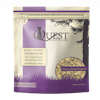
Cannabidiol (CBD) is undeniably experiencing a boom in the pet space, and that boom has created several different challenges for the new segment. Chief among these challenges is the dual struggle to navigate both the nebulous legality of the ingredient and the lack of clear regulation on its use in pet products.
Is CBD legal?
The U.S. government essentially kicked off the CBD frenzy in 2018, when it signed into law the Agriculture Improvement Act of 2018 (otherwise known as the 2018 Farm Bill). The bill removed hemp from the Controlled Substances Act (CSA), which means that cannabis plants and derivatives that contain no more than 0.3% tetrahydrocannabinol (THC, the main psychoactive compound in cannabis) on a dry weight basis are no longer controlled substances under federal law.
However, to muddy the waters, the bill also preserved FDA’s authority to regulate products containing cannabis or cannabis-derived compounds (like CBD) under both the Federal Food, Drug and Cosmetic Act (FD&C Act) and the Public Health Service Act (PHS Act). And according to the agency, “FDA treats products containing cannabis or cannabis-derived compounds as it does any other FDA-regulated products — meaning they’re subject to the same authorities and requirements as FDA-regulated products containing any other substance. This is true regardless of whether the cannabis or cannabis-derived compounds are classified as hemp under the 2018 Farm Bill.”
As of October 2019, FDA has not approved a marketing application for cannabis for the treatment of any disease or condition, and there is only one cannabis-derived medication (containing CBD and used for the treatment of seizures) and three cannabis-related drug products approved for use in the U.S. — and they’re only available in very limited circumstances and must be prescribed.
What does this mean for pet products containing CBD? According to FDA, “it is a prohibited act to introduce or deliver for introduction into interstate commerce any food, including any animal food or feed, to which THC or CBD has been added.” What’s more, as the agency points out, there are no approved food additive ingredient definitions listed in the Association of American Feed Control Officials’ (AAFCO) Official Publication for any substances derived from hemp.
FDA currently actively cautions pet owners against the use of any cannabis-related products, including those containing CBD. In addition, in 2019 the agency has sent out six warning letters to companies marketing unapproved new drugs allegedly containing CBD, for violations including the amount of CBD in a product being higher than what the company claimed, unsubstantiated health or medical claims, improper labeling as a dietary ingredient, misbranding, and introducing CBD-containing products into interstate commerce. At least two companies receiving said letters were specifically called out for pet products containing CBD.
How pet companies selling CBD products are navigating legality
Pet companies that have entered the CBD segment have mostly chosen to go the supplements route, partnering with the National Animal Supplement Council (NASC) and adhering to the industry group’s regulations as strictly as they can.
Treatibles is one of the more established players in the CBD pet products market, having launched their initial product line in 2013 and existing in the cannabis space since 2008.
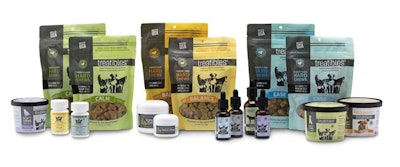
Treatibles, a veteran in the CBD space, offers a full lineup of pet products including hard and soft chews, capsules, creams and oils. | Courtesy Treatibles
“Navigating these changing waters is something Treatibles is comfortable with and proactive about,” said Julianna Carella, company founder and CEO. “Our long history in the cannabis space began in 2008, and we have been on the forefront of cannabis and hemp regulatory compliance ever since. Understanding the nuances of compliant packaging and marketing of a CBD product is a huge undertaking, and we are glad to have successfully achieved this through our work with NASC.”
Earth Animal ventured into the pet CBD market two years ago, starting in 2017 with one year of intensive product research before launching the final products in 2018. According to company Co-founder Dr. Bob Goldstein, Earth Animal will limit its CBD-containing pet products to the supplement space until AAFCO gives the green light to include the ingredient in pet foods or treats.
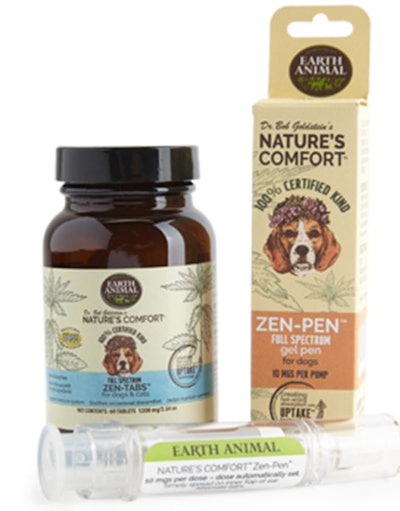
Earth Animal provides the Nature’s Comfort zen line, which is veterinarian-formulated and includes the Zen-Pen for dogs and cats. The product contains full-spectrum hemp with naturally occurring CBD. | Courtesy Earth Animal
“We’re a member of [NASC], and we use their guidelines and make sure we meet every one of their guidelines,” said Goldstein. “We feel confident that if we stay with the NASC guidelines and we meet everything that they’re requesting, we are doing it the right way and we shouldn’t have any problems. From a federal level, I don’t think there are any problems. Various states are going to have their own opinions, and we’ll just take those states on an individual basis and work with NASC to satisfy what the state is asking from us.”
Education is playing a significant component in getting products out there safely, both on the retail side and directly to pet owners.
“We’re out there every chance we get,” said Heidi Hill, owner of Holistic Hound, which has been in the CBD pet product space since 2015. “We hope that word gets out to retailers to help them know what to look for when they’re vetting companies. Like, how long have they been in the business? Do they have a background in health and wellness? Are they a member of NASC? Is their hemp organically grown or certified organic? Do they provide third-party testing on their website, not upon request — is it out there for the public to see?”
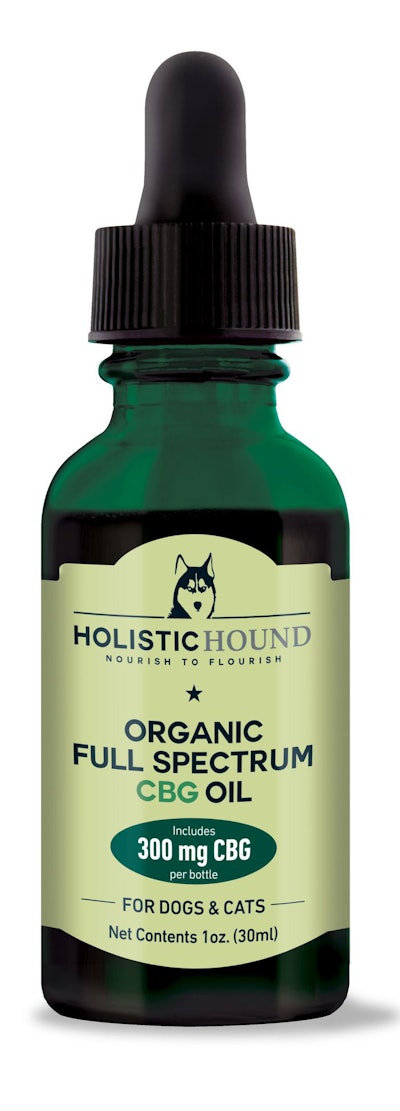
Holistic Hound has taken things one step further with the recent release of its full spectrum cannabigerol (CBG) oil for pets. CBG is known as the chemical parent of CBD and THC, with its own set of benefits. | Courtesy Holistic Hound
Testing is playing a pretty big role in the education component of selling CBD products, and is being used as a differentiator from newer companies that might not be as transparent.
“Every three months this industry is dealing with a new change in the regulations, so we just have to be flexible and stay ahead of all that,” said Dr. Jay You, DVM, founder of Dr. You+ and one of the newer companies to the pet CBD market. “One of the ways we’re trying to stay in front is with our laboratory testing. We added a QR code that links directly to every test result for every batch with a batch number and all the packaging. It lets the clients know we’re proud of what we’re making and we’re not hiding behind a label or just getting the product from another manufacturer and putting our own label on it. We have our own lab and we have a contract with an FDA-approved farm. It’s going to be very interesting to see where this is going to go.”
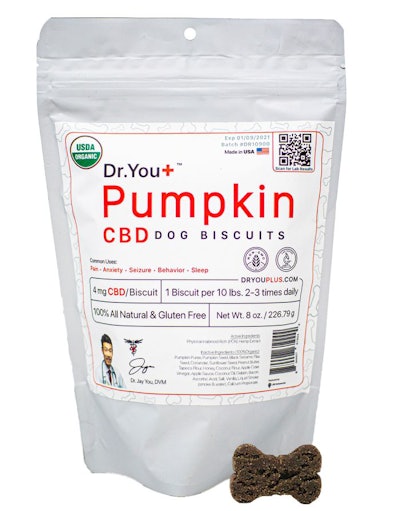
Dr. You+ has an extensive, veterinarian-developed CBD line that includes pumpkin CBD dog biscuits, commonly used by customers to help their pets with pain, anxiety, seizures, behavior and sleep. | Photo courtesy Dr. You+
Market will continue to grow, but unprepared companies will be forced out
Everyone seems hopeful that the regulatory confusion will get sorted out soon, if only because clarity will result in a “weeding out” of those companies that jumped into the market unprepared or unwary of what it is they’re actually selling to pet owners.
“Even people who think they know about these products know less than they think they know,” said Hill. “These products are powerful but they’re not a panacea. They’re not a cure-all, but they are the most powerful supplements I’ve seen in the 16 years I’ve been selling animal supplements. They’re not only super effective, they’re also very, very safe — it’s a great combination. But they’re not meant to be a replacement for medicine, and people should also be aware of that.”
Letting the less scrupulous companies fade out so the more legitimate companies can grow is an expected part of building a new market segment, according to experts.
“We believe that there will be a weeding out of companies and players that aren’t up the standard they should be and don’t have products that really work,” said Goldstein. “I think that’s a normal process that will cull out some of the players that really shouldn’t be there. I [also] think the survivors and the over-the-counter market will become solid for those everyday issues animal put up with, and there will be a boom in the veterinary field as the research proves there are other clinical applications for the hemp plant.”
The overall hope is that product quality will increase, leaving consumers more confident in their choices when looking at CBD products for their pets.
“I think there’s a lot of white labeling going on, and it’s not good,” said You. “And there are a lot of companies [with CBD products] that decided to go into the pet industry just because they know there are a lot of pet users, and that’s also not good. I hope the regulations will come and weed out some of those players, and bring quality to the industry.”

